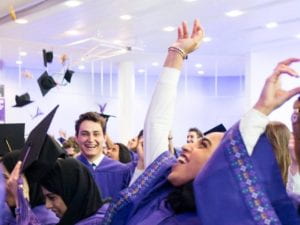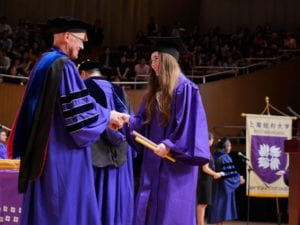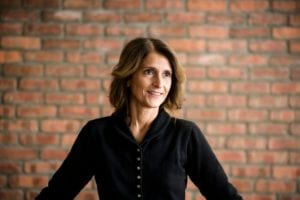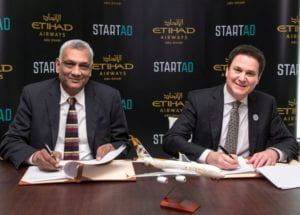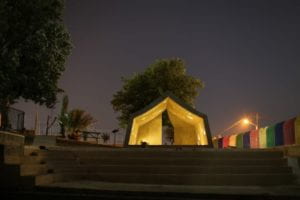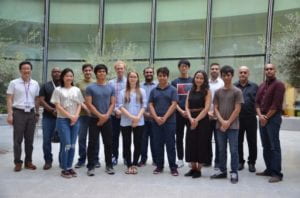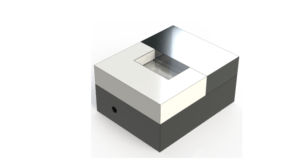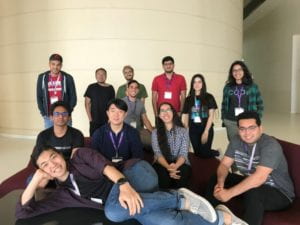 Dawa, an application designed to tackle counterfeit medicine in the region using blockchain based pharmaceutical distribution, and Boosala, a refugee location application, have won top honors at NYU Abu Dhabi’s 8th Annual International Hackathon for Social Good in the Arab World.
Dawa, an application designed to tackle counterfeit medicine in the region using blockchain based pharmaceutical distribution, and Boosala, a refugee location application, have won top honors at NYU Abu Dhabi’s 8th Annual International Hackathon for Social Good in the Arab World.
Dawa was designed by a team of eight students who were mentored by Cloud Developer Advocate IBM Saif ur Rehman, Technology Solution Professional at Microsoft Saeed Motamed, and IBM Cloud Developer Naiyarah Hussain. The students represented universities from across the region, including NYU Abu Dhabi, University of Wollongong in Dubai, BITS Pilani Dubai Campus, and M’sila University, Al Akhawayn University and Misr International University from Algeria, Morocco, and Egypt respectively.
The team behind Boosala, designed to locate missing family members and contacts among refugees, comprised seven team members led by mentors including Cloud Developer Advocate at IBMNikita Mathur, Executive Director at OpenCurriculum Varun Arora, and CEO at Kandw Technologies International Khalid Machchate. Universities represented through Boosala included NYU Abu Dhabi and Khalifa University, as well as other universities in the region such as ESPRIT, University of Science and Technology Houari, and American universities NYU and Wellesley College.
The event was organized by Founder and Chair of the NYUAD Hackathon, Clinical Professor of Computer Science at NYU New York and Affiliated Faculty at NYUAD Sana Odeh. Commenting on the occasion, Odeh said, “This Hackathon has offered yet another round of outstanding ideas and solutions that reflect the spirit of innovation shown across all the teams that participated, which made the final decisions for the judges especially challenging this year. Each team has grown remarkably over the course of these intensive three days, learning, and gaining expert knowledge.”
“NYUAD Hackathon is designed to encourage and secure an opportunity for cross-collaboration and entrepreneurship across computer science, bringing together people from all over the world with different ideas in order to expand the scope of understanding amongst participating students. This experience allows them to grow and learn through exposure to new concepts that act as an incubator for remarkable feats of innovation,” she added.
The second prize went to Huwayeti, a blockchain-based layer on top of UNHCR refugee registration to manage trusted agents’ claims made about refugees. The team was mentored by CEO of Sahem.ae Hussam Mohsineh and Software Engineer at Massachusetts Institute of Technology (MIT)/Improbable Keeley Erhardt. Four of the six members of this were from NYU Abu Dhabi, while the additional team members came from Yale University and the École polytechnique fédérale de Lausanne.
Third place was offered to the team responsible for devising a platform that assists refugees and asylum seekers in communicating with healthcare professionals using machine learning and natural language processing called MedLughati. Mentored by NYUAD alumna and current Rhodes Scholar pursuing a PHD at University of Oxford Farah Shamout and Software Engineer at Facebook UK Miguel Sanchez, the students behind MedLughati represented a wide range of institutions including University of Wollongong, BITS Pilani Dubai Campus, Stanford University, University of Oxford, University of Buenos Aires and Khalifa University in Egypt.
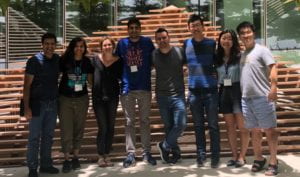 Aspiring hackers from across the globe came together at NYU Abu Dhabi from April 27 for the three-day event. Participants were divided into 10 teams and mentored by renowned international computer science professors, founders of successful startups, technology professionals, and venture capitalists.
Aspiring hackers from across the globe came together at NYU Abu Dhabi from April 27 for the three-day event. Participants were divided into 10 teams and mentored by renowned international computer science professors, founders of successful startups, technology professionals, and venture capitalists.
The Audience Award for the occasion was given to Wadhafni, an SMS-based mobile app that links unemployed skilled individuals with the local labor market on a tasks-accomplishment basis. The team, comprised of students representing prestigious institutions such as the University of Edinburgh, NYU Shanghai, Middlesex University Dubai, ENSAM Casablanca and NYU Abu Dhabi, was mentored by Software Engineer at Think.iT Abir Chermiti, and Software Engineer at Google Fabricio Pontes Harsich.
For additional information on the 2018 Annual NYUAD International Hackathon for Social Good in the Arab World, visit http://sites.nyuad.nyu.edu/hackathon/
This post comes to us from NYU Abu Dhabi. You can read the original here.

